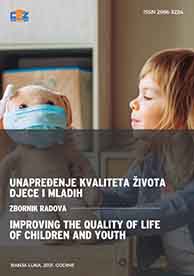IMPLICITNE PEDAGOGIJE ODGAJATELJA
IMPLICIT EDUCATOR PEDAGOGIES
Author(s): Marija Guć, Joško Barbir, Sonja KovačevićSubject(s): Preschool education, Social development, Pedagogy
Published by: CENTAR MODERNIH ZNANJA
Keywords: history; pedagogy; implicit theory; curriculum; hidden curriculum;
Summary/Abstract: The implicit pedagogy is based on the basis of personal experience, the system of values, beliefs and attitudes in which an individual believes deeply, and in relation to a child it is a value system on the child's character, abilities, needs, and appropriate educational procedures. Implicit theories, which are thought to occur in the early stages of life, are different from scientific theories because they contain values that are found in the kindergarten collective and the classroom, not in the official curriculum as science-based theory. The implicit teachers' theory represents a complex set of knowledge, attitudes, skills, family life, and institutional education levels of pre-school education through to university education and educational practices. There are traditional (teacher has a dominant and student has a passive role) and well organized classes (democratic environment and emphasis on activities students). Implicit pedagogy is based on personal experiences, value systems, beliefs and attitudes in which the individual deeply believes, and in relation to the child it represents a value system about the child's character, his abilities, needs, and appropriate educational procedures. Implicit theories, which are thought to emerge in the early stages of life, differ from scientific theories because they contain values found in the educational collective and educational group rather than in the official curriculum as scientifically based theories. The aim of this paper was to examine the attitudes of educators about different claims related to their work itself. Questions included claims about the purpose of preschool education, the development of educational work, curriculum construction, contact with a parent, learning children from other children and through planned activities, helping to solve problems and problem situations. The conclusions we reached based on the data and statistical testing revealed a currently unexplored structure within the educational attitude and their implicit pedagogy according to the above statements, and provided inspiration and foundations for further research on this topic.
Journal: DRUŠTVENE DEVIJACIJE
- Issue Year: VI/2021
- Issue No: 6
- Page Range: 58-66
- Page Count: 9
- Language: Bosnian, Croatian, Serbian

